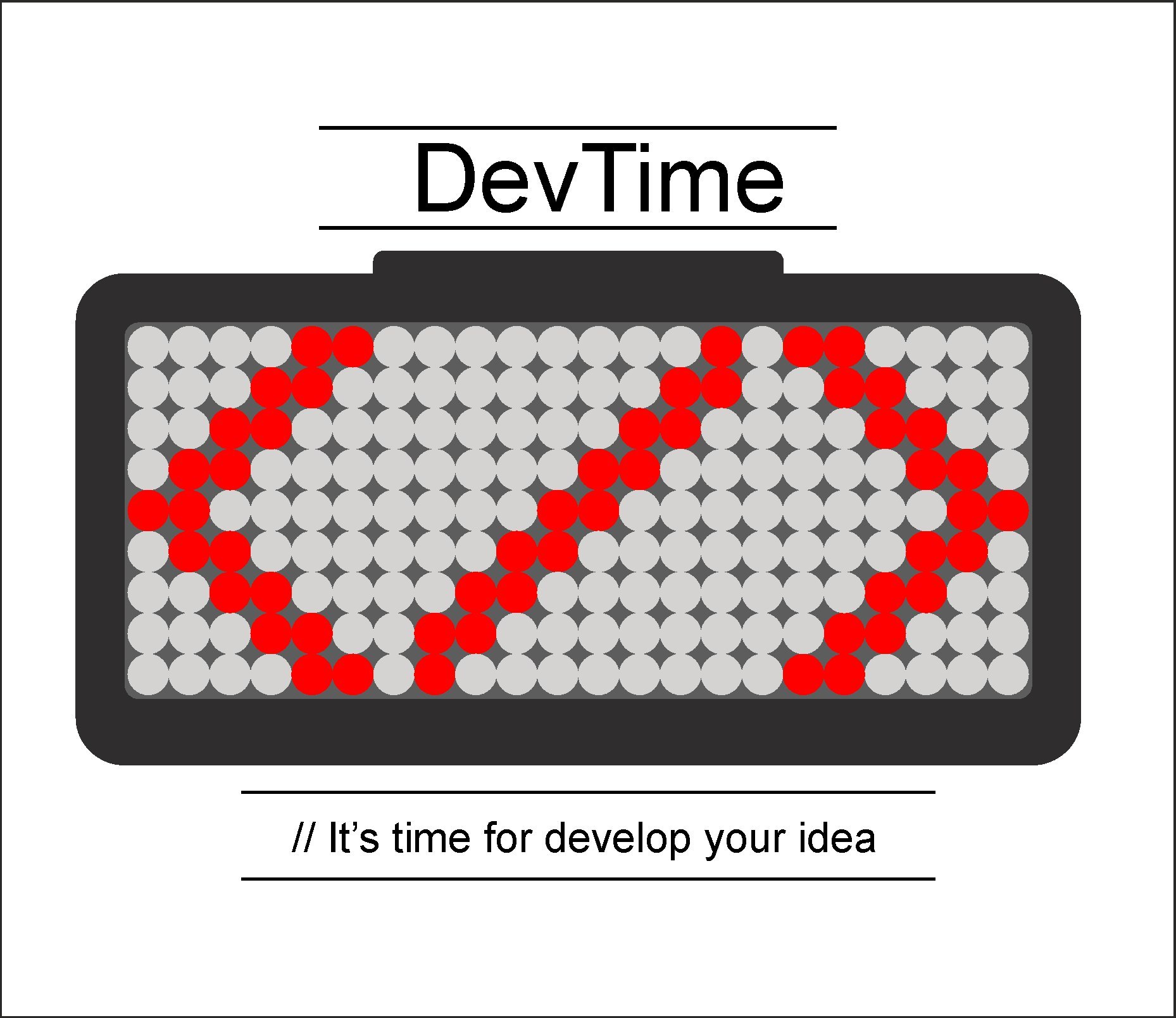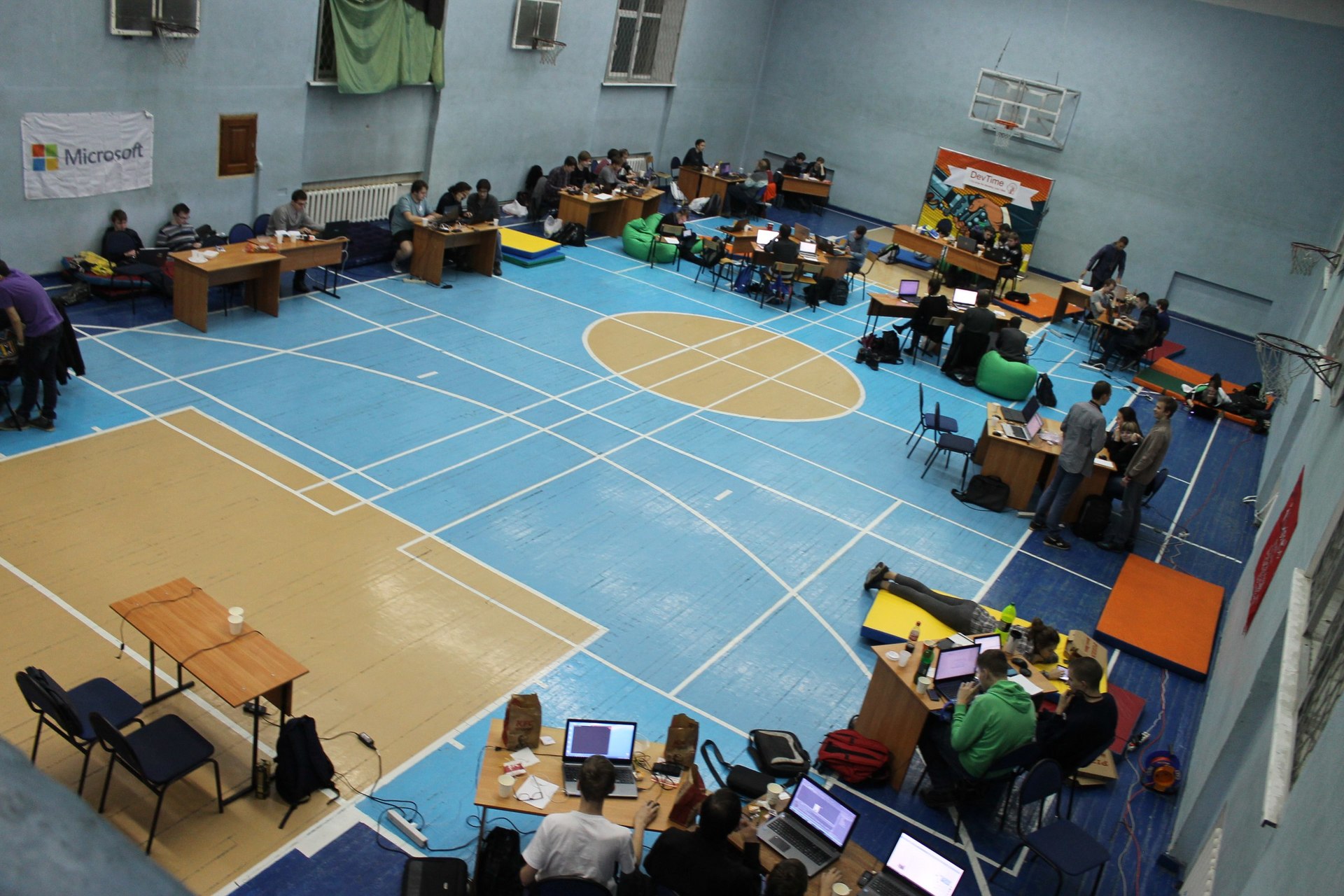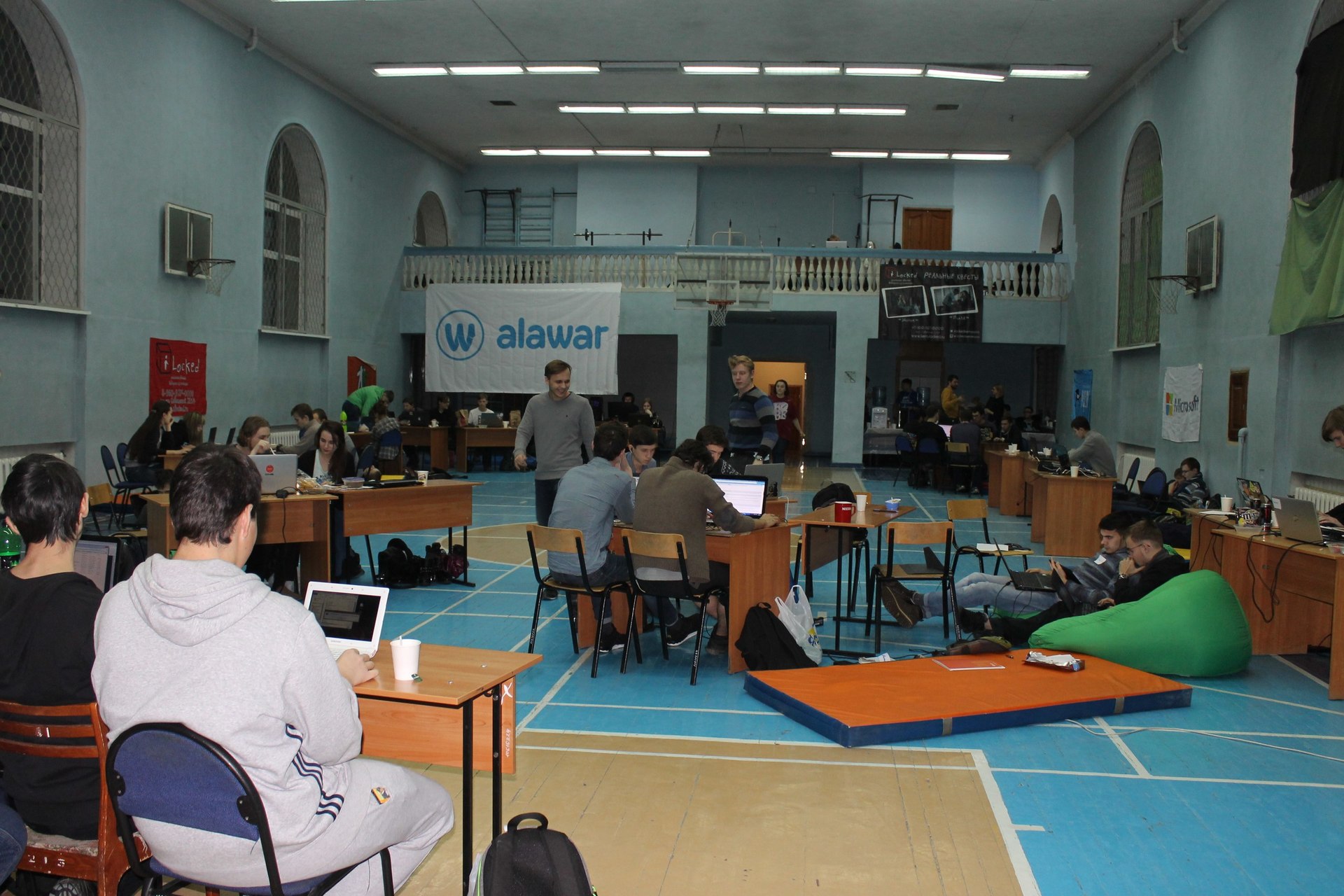Kemerovo hackathon "DevTime"
Kemerovo. The end of autumn. It feels like deep frosts, because the temperature dropped to thirty degrees below zero and promised to drop below. In the well-heated gym of the KuzGTU building, there was the second (around the city) hackathon DevTime. The first was held in April 2016, and it was mentioned in my debut article .

They came to the organization no less seriously: the organizers took into account the mistakes of the first event, IT-Salad. The holding of the current one was announced three months before the start, so that people who showed a desire to participate had plenty of time to prepare. The number of participants from last time has increased significantly. I even noticed a few familiar faces.
The main organizer of “DevTime” was Alexander Kokulin, “Microsoft Student Partner”. Anastasia Karmanova (“Megaphone”), Marina Semekhina (“Atvinta”) and KuzGTU in the person of Alexander Alexandrovich Bakanov provided very good support to him. Also partners of the DevTime hackathon were: Microsoft Corporation, Atvinta Digital Agency, Megafon, GoodLine, Alawar, IIDF.

')
At 10:00 registration of participants began. In the hall KuzGTU gathered a considerable turn. Hackathon lasted more than a day - by 17:30 the next day he came to an end.
I interviewed a small team of developers, my good friends Maxim (M) and Vladislav (B). I broke the interview into several parts. Thus, the article is supplemented by comments from people who participated in the development.

The floors of the gym were covered with gymnastics mats, lined with tables. Participants settled down at the tables. Every man came with his laptop. Particularly lucky participants snatched themselves soft green ottomans.
Hackathon “DevTime” is highly specialized - its participants were engaged in the development of mobile applications and games. During the day, the 20 teams gathered to impose their own projects. Most of them worked on games, but applications turned out to be surprisingly few.
The hackathon participants used different languages - C ++, C #, Java, JS (if you think, they are not that different). Some worked in bundles like C # + XAML. There were those who refused the code - they worked visually. But, as it turned out in the final of the work, it was not at all the means that determined the places of victory.
As it turned out later, the jury was not very interested in the details of project development. They evaluated them not by implementation, but by the ideological component. The people working on the code, not the products as a whole, were not very lucky.

At the event site even conducted internal competitions! In particular, by the beginning of the hackathon, the organizers announced a contest of posts in the social networks Instagram and Vkontakte for the number of reposts and likes - the results were announced by midnight. Immediately launched a second contest, the essence of which was to capture the sleeping developers in the photo. Organizers checked on the tag #devtime. Happy contest winners were content with small balls, pens and stickers.

Until the night, almost every participant involved in the development. There was a cozy working atmosphere. Of course, at night people began to tire. To distract, they had a good time: they actively communicated with each other, danced to the music. Many did not stop working - it seemed that people took the development seriously and seemed to be firmly aimed at winning. By morning, they had to refine the projects, make the final touches and prepare for the presentation of works.
What to say about competition? There was no ardent struggle for prizes. Team members did not compete, but rather helped others. Rescued other teams. Someone helped with image editing, someone gave advice on implementation. This is how it should be on hackathons.

The weather outside the window continued to deteriorate. People who went outside for a smoke break were “cut” by severe frost on their skin. Indoors it became hot - the working process was going on with might and main.

When you go home after the hackathon (South Park, S04, E17).
I will be frank: not everyone can enjoy a visit to the hackathon. First, events of this kind adversely affect the body, depleting the person. After “DevTime” (as well as after the previous Kemerovo “IT-Salad”, and after any of this), the participants recovered for a very long time - we need at least one day to restore the mode of life after a hard sleepless night. Secondly, the participants are not always absolutely happy with the results of the event, because the prizes are limited. Nothing pleases as a victory. Who would not say, and the victory is a good reward for hard work. And yet, if you consider yourself to be people who are madly in love with software development, if you cannot live without a computer, or even if you are simply interested in this article, then be sure to consider taking part in the next hackathon of yours or the nearest city. Despite the few shortcomings, hakatons are really interesting and useful.

They came to the organization no less seriously: the organizers took into account the mistakes of the first event, IT-Salad. The holding of the current one was announced three months before the start, so that people who showed a desire to participate had plenty of time to prepare. The number of participants from last time has increased significantly. I even noticed a few familiar faces.
The main organizer of “DevTime” was Alexander Kokulin, “Microsoft Student Partner”. Anastasia Karmanova (“Megaphone”), Marina Semekhina (“Atvinta”) and KuzGTU in the person of Alexander Alexandrovich Bakanov provided very good support to him. Also partners of the DevTime hackathon were: Microsoft Corporation, Atvinta Digital Agency, Megafon, GoodLine, Alawar, IIDF.

')
At 10:00 registration of participants began. In the hall KuzGTU gathered a considerable turn. Hackathon lasted more than a day - by 17:30 the next day he came to an end.
I interviewed a small team of developers, my good friends Maxim (M) and Vladislav (B). I broke the interview into several parts. Thus, the article is supplemented by comments from people who participated in the development.
Interview
I: Hi! Tell us about your team. How did it happen that you decided to take part in the hackathon?
M: Hi. Our team is called “WTF-Team”. Until the last days, we did not know why we were going to the hackathon, and what we would do here. They didn’t even know what the members of our team would be. The composition is constantly changing. Well, here we are. * laughs *
Me: What goals does your team have? Victory or experience, what is the priority?
M: Two of the three team members are here for the first time. For us, this is new. We wanted to see how everything is organized. Test your strength, learn something new. Something like this.

The floors of the gym were covered with gymnastics mats, lined with tables. Participants settled down at the tables. Every man came with his laptop. Particularly lucky participants snatched themselves soft green ottomans.
Hackathon “DevTime” is highly specialized - its participants were engaged in the development of mobile applications and games. During the day, the 20 teams gathered to impose their own projects. Most of them worked on games, but applications turned out to be surprisingly few.
Interview
Me: Do you think it is worthwhile to seriously fear the work of other participants if you plan to win?
M: To begin with, our team initially did not want to win. I just wanted to take part. In my opinion, we are the most ... newbies. And do not reach the level of the rest.
Q: The skill level of people is much higher than it was on the previous hackathon. Therefore, I feel stupid compared to others.
The hackathon participants used different languages - C ++, C #, Java, JS (if you think, they are not that different). Some worked in bundles like C # + XAML. There were those who refused the code - they worked visually. But, as it turned out in the final of the work, it was not at all the means that determined the places of victory.
As it turned out later, the jury was not very interested in the details of project development. They evaluated them not by implementation, but by the ideological component. The people working on the code, not the products as a whole, were not very lucky.

At the event site even conducted internal competitions! In particular, by the beginning of the hackathon, the organizers announced a contest of posts in the social networks Instagram and Vkontakte for the number of reposts and likes - the results were announced by midnight. Immediately launched a second contest, the essence of which was to capture the sleeping developers in the photo. Organizers checked on the tag #devtime. Happy contest winners were content with small balls, pens and stickers.

Until the night, almost every participant involved in the development. There was a cozy working atmosphere. Of course, at night people began to tire. To distract, they had a good time: they actively communicated with each other, danced to the music. Many did not stop working - it seemed that people took the development seriously and seemed to be firmly aimed at winning. By morning, they had to refine the projects, make the final touches and prepare for the presentation of works.
What to say about competition? There was no ardent struggle for prizes. Team members did not compete, but rather helped others. Rescued other teams. Someone helped with image editing, someone gave advice on implementation. This is how it should be on hackathons.
Interview
I: If you want, you can tell about your work, your application. What is it like?
M: We are creating a universal (cross-platform) application. We test on Windows 10 and Windows Phone. The very essence of the application lies in the fact that the user selects the type of hobby he needs (or sports, say). And the application displays a list of places where you can have a good time.
Q: With the help of the application, people pursuing the same goals can gather in any part of the city. For example, snowboarders can mark on the map good slopes, jumps, interesting places for other snowboarders inside the city.
Me: So who is the application for?
M: For young people. Basically, on athletes.
Q: This is not to say that it is only for athletes. The application is designed for a vast part of society, enthusiastic about something. If we talk about the age audience, then probably the application is suitable for people 13-60 years. Any technologically educated person can put a mark on the map and collect those who are interested in such an event.

The weather outside the window continued to deteriorate. People who went outside for a smoke break were “cut” by severe frost on their skin. Indoors it became hot - the working process was going on with might and main.
Interview
I: Maxim, this hackathon is the first for you. Question: Did you have something like this in your life? At least roughly similar to what is happening now?
M: No. Did not have.
Me: What did you feel when you came here?
M: How cold.
I what?
M: Well, you know, early in the morning my roommate woke me up. Get ready, says, and then you will be late. I went. He sat on the tram. I drove one stop and got out of the wrong place. A few minutes in the cold waiting for his colleagues, his friends. Then I had to go from that stop to KuzGTU, where another fifteen minutes waited for other participants. Together they waited for the start of registration. Terribly cold. When I entered the building of the university, my first feeling was: “How cold!”.

When you go home after the hackathon (South Park, S04, E17).
I will be frank: not everyone can enjoy a visit to the hackathon. First, events of this kind adversely affect the body, depleting the person. After “DevTime” (as well as after the previous Kemerovo “IT-Salad”, and after any of this), the participants recovered for a very long time - we need at least one day to restore the mode of life after a hard sleepless night. Secondly, the participants are not always absolutely happy with the results of the event, because the prizes are limited. Nothing pleases as a victory. Who would not say, and the victory is a good reward for hard work. And yet, if you consider yourself to be people who are madly in love with software development, if you cannot live without a computer, or even if you are simply interested in this article, then be sure to consider taking part in the next hackathon of yours or the nearest city. Despite the few shortcomings, hakatons are really interesting and useful.
Source: https://habr.com/ru/post/315672/
All Articles